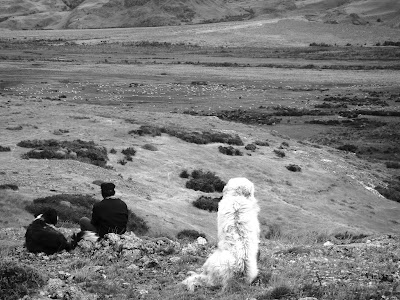It has been over a
month and a half since I left snowy Colorado for the winds of Patagonia. There
is a reason why this place is legendary for adventures seeking to live on the
edge, with no major landmasses to interrupt the winds circling the globe, they
slam into Patagonia full bore.
This is also an isolated place; outside goods and produce do make it
here but only once a week, in limited quantity and quality. As a result, homesteading here is more
of a necessity than a hobby.
Walking through the nearby town of Cochrane one finds chickens roaming
the streets, fruit trees everywhere, and small greenhouses/gardens in most backyards. I’ve even seen urban sheep herds.
At the Estancia, I’ve
been busy and have finished building two greenhouses and repaired a third. Each has been a different rewarding
experience; in many ways, I have learned more from the park rangers than they
have from me. At Daniels house I
watched as he skillfully cut down Lenga (beech trees), and then milled it into
semi dimensional lumber using only a chainsaw. All of the wood, stone, and earth were obtained on
site.
 |
| Daniel showing off his chainsaw handling skills. |
 |
| Finished Greenhouse at Daniels |
Creativity in use of
available resources has been essential to this project. The second greenhouse was built at
Eduardo Castro’s house, who manages the herd of cows still on the
Estancia. Eduardo had a surplus of
old wood posts, which we cut and assembled like a log cabin to build the
frame. I struggled to find good
quality soil at first, but as I spent more time observing the property found an
old chicken coop, horse/cow manure everywhere, and a 5 year old pile of wood
shavings that yielded a great amount of rich soil beneath it.
 |
| Greenhouse frame at Eduardo Castros house constructed from old fence posts. |
 |
| Planting the finished greenhouse with Eduardo Castro |
My third trip was out
to the eastern edge of the park 6 km from the Argentine border. René’s house is at the end of a
windswept plain and he already had an existing greenhouse built in a sheltered
location. We sacrificed a bit of
ideal sunshine for protection from the wind with trees and repaired the
greenhouse, adding a few outside raised beds. René takes care of the remaining 1000 sheep, down from
30,000 in the Estancia’s heyday.
He also is running the pilot sheep dog program, which uses Great
Pyrenees to protect the sheep from the numerous puma, which live in the
mountains above them.
 |
| Old greenhouse overgrown with weeds |
 |
| René watering the finished garden with repaired greenhouse. We mulched cut weeds, manure, and sawdust to create worm farm pathways. |
Each one of the park
rangers lives a simple life, spending time alone with the land. They make the journey into town
infrequently, and all seem to love their work. Large-scale development projects
such as the massive Hydropower dams proposed on the Rio Baker have no appeal to
the rangers as they are out of touch with their lifestyles. They have a wealth of knowledge of
their homes, and it has been an honor to spend time with them. It may be a slow life but it is quite
Tranquillo.
 |
| René, his herding dog Pobre and one of the Great Pyrenees overlooking the sheep herd. |
 |
| Small sheep herd behind Renés house. |
 |
| The next generation of sheep protectors. |








